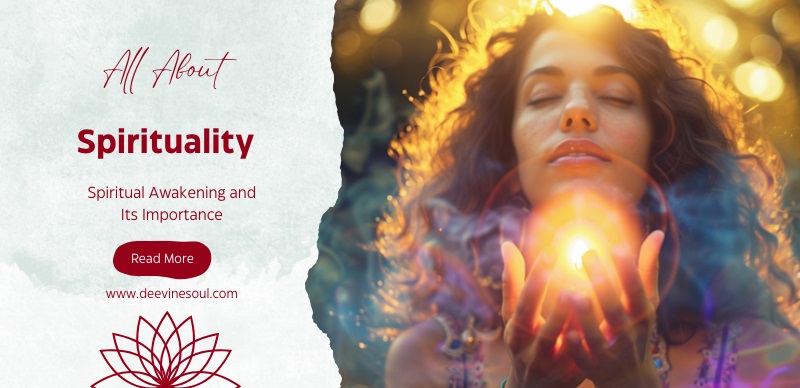Spirituality for the Divine Soul
Spirituality has become a cornerstone for many people seeking inner peace and purpose in today’s fast-paced world. While often associated with religion, spirituality goes beyond organized practices, diving into a personal journey of self-discovery and awareness. Unlike the rigid structures of traditional religions, spirituality is fluid, flexible, and open-ended. It encourages individuals to look inward, question, and cultivate a deep, authentic connection with their inner selves.
Why does spirituality resonate so strongly with people today? The answer lies in the search for something more meaningful than day-to-day routines and external success. Many people feel a yearning to connect with something larger than themselves, to find purpose, clarity, and calm amidst life’s chaos. This search often leads to spirituality, which offers a pathway to inner peace by connecting with the core of who we are — often referred to as the “divine soul.”

Understanding the Concept of the Divine Soul Spirituality
The divine soul represents the truest, purest form of our essence. It’s the part of us untouched by societal expectations, personal fears, and material distractions. Often described as our higher self or true self, the divine soul is our innermost nature, filled with qualities like love, compassion, and wisdom. It’s what we experience when we feel unconditional love or a deep sense of peace and purpose.
Spirituality offers tools and practices to help us uncover this divine soul. Rather than something outside us, it’s a part of us waiting to be acknowledged and embraced. When we connect with our divine soul, we discover our authentic self, leading to a sense of completeness and inner harmony.
History of Spirituality
Spirituality has deep roots that span across cultures and civilizations. Ancient Egyptian, Sumerian, and Indus Valley cultures all had spiritual practices aimed at understanding life’s mysteries and connecting with higher forces. Whether through meditation, ritual, or prayer, these early societies recognized a spiritual dimension in life, believing in the soul’s immortality and the existence of a divine force within each individual.
In modern times, spirituality has evolved from ancient traditions and philosophies to suit the personal and flexible needs of individuals today. Unlike organized religion, which follows specific doctrines and rituals, spirituality allows individuals to explore beliefs that resonate personally, drawing from various philosophies, teachings, and experiences.
Spiritual Awakening and Its Importance
A spiritual awakening is a transformative experience in which individuals become deeply aware of their spiritual nature. Often, this awakening happens suddenly or gradually over time, leading to a profound shift in perception and values. During a spiritual awakening, people may question old beliefs, seek new perspectives, and feel a stronger connection to their divine soul.
This awakening is significant because it opens the door to a more authentic life. We begin to see beyond surface-level achievements and ego-driven pursuits, realizing that our true purpose lies in personal growth, love, and understanding. In essence, a spiritual awakening brings us closer to our divine soul, allowing us to live a life of depth and meaning.
Core Principles of Spirituality
Spirituality is not about strict rules or dogma; rather, it’s about values that lead to a more fulfilled, compassionate life. Here are some core principles of spirituality:
- Love and Compassion: True spirituality is rooted in love and compassion, both for ourselves and others.
- Interconnectedness: Spirituality teaches us that we are all connected, part of a larger whole. Recognizing this unity fosters empathy and kindness.
- Acceptance and Forgiveness: By practicing acceptance, we learn to let go of resentment and judgment, embracing a more peaceful state of mind.
These principles create a foundation for spiritual growth, guiding us towards a more harmonious relationship with ourselves, others, and the world.
Benefits of Embracing Spirituality
The benefits of spirituality go beyond mental peace; they enrich every aspect of our lives. Studies have shown that spirituality can reduce stress, alleviate symptoms of anxiety and depression, and improve emotional resilience. Additionally, it fosters a sense of purpose, helping individuals find meaning in their lives. As we connect with our divine soul, we also experience a greater sense of fulfillment, inner calm, and strength to navigate life’s challenges.
Meditation as a Gateway to Spirituality
Meditation is one of the most powerful tools for connecting with our spiritual nature. By stilling the mind, meditation allows us to tap into a deeper level of awareness, one that transcends daily worries and distractions. Through regular meditation, we cultivate mindfulness, learn to observe our thoughts without attachment, and ultimately access the divine soul within.
Mindfulness, a key aspect of meditation, helps us stay present and engaged with our inner state. It’s a practice that opens the door to inner peace and a more profound sense of connection to life.
Exploring Different Spiritual Practices
Spirituality isn’t a one-size-fits-all journey. There are countless ways to explore and express our spiritual nature. Here are a few popular practices:
- Prayer and Devotion: Expressing gratitude, asking for guidance, or simply feeling connected to a higher power can foster spiritual awareness.
- Nature Walks: Spending time in nature, observing its beauty and complexity, brings a sense of peace and connection to something greater.
- Energy Work: Practices like Reiki and chakra balancing focus on harmonizing the body’s energy, promoting well-being and spiritual alignment.
Each of these practices provides a unique way to explore spirituality and connect with the divine soul.
Power of Self Reflection in Spirituality
Self-reflection is a cornerstone of spiritual growth. Through practices like journaling or contemplative thought, we learn more about ourselves, uncovering deeper truths about our desires, fears, and beliefs. Self-reflection is a powerful tool that allows us to clarify our values, resolve inner conflicts, and align more closely with our divine soul.
Living a Spiritual Life in a Modern World
Living a spiritual life in today’s busy world may seem challenging, but it’s entirely possible with small, meaningful practices. Setting aside even a few minutes each day for meditation or gratitude can help maintain a spiritual connection. Practicing mindfulness in daily activities, like mindful eating or mindful walking, is another way to integrate spirituality into everyday life.
Spiritual Guides and Teachers
Many people find it helpful to learn from spiritual guides or teachers. These individuals can provide valuable insights, wisdom, and support on your spiritual journey. Whether through books, workshops, or mentorship, connecting with a teacher or a community can deepen your understanding and experience of spirituality.
Overcoming Obstacles on the Spiritual Path
Every spiritual journey has its challenges. Doubts and insecurities can arise, making it difficult to stay committed. It’s essential to remember that setbacks are a natural part of growth. Building resilience through spirituality can help navigate these obstacles, fostering a sense of trust in the journey.
Role of Gratitude and Humility
Gratitude and humility are essential aspects of spirituality. Gratitude enhances our awareness of the blessings in our lives, fostering a sense of abundance and joy. Practicing gratitude daily helps us focus on the positive aspects of life, leading to a more optimistic outlook.
Humility is another vital component. It allows us to recognize that we are part of something greater than ourselves. Cultivating humility encourages us to be open-minded, receptive to learning, and respectful of others’ paths.
Real-Life Stories of Spiritual Transformation
Inspiration often comes from the stories of others. Many individuals share how embracing spirituality has transformed their lives — from overcoming addiction to finding a renewed sense of purpose. These accounts remind us that the journey is unique for everyone, filled with opportunities for growth, connection, and healing.
Embracing Spirituality as a Journey
Embracing spirituality is not about reaching a final destination; it’s a lifelong journey of self-discovery and connection with the divine soul. Each step, no matter how small, brings you closer to understanding your true self and finding inner peace. As you embark on this path, be gentle with yourself, celebrate your progress, and remain open to the beauty of the journey.
Frequently Asked Questions
+ What’s the difference between spirituality and religion?
– Spirituality is a personal exploration of one’s inner self and connection to a higher power, while religion is a structured system of beliefs and practices.
+ Can spirituality help with anxiety and depression?
– Yes, many people find that spiritual practices reduce anxiety and depression by fostering a sense of purpose and connection.
+ How can I start my spiritual journey?
– Begin with simple practices like meditation, mindfulness, or journaling to explore your thoughts and feelings.
+ Do I need a teacher to become spiritual?
– While a teacher can provide guidance, many find spirituality through personal exploration and self-reflection.
+ How can spirituality improve my daily life?
– Spirituality fosters greater awareness, compassion, and resilience, leading to improved relationships and overall well-being.
